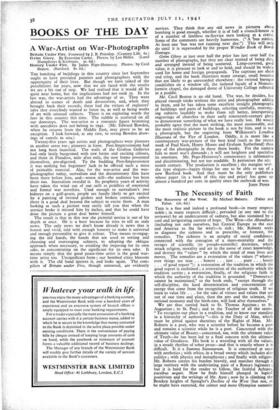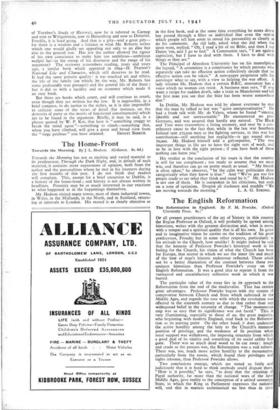The Necessity of Faith
The Recovery of the West. By Michael Roberts. (Faber and Faber. I2S. 6d.) Tins is a fine and indeed a profound book—in many respects noble ; in many respects difficult ; pervaded (at any rate to the reviewer) by an undercurrent of sadness but also sustained by a cool and invigorating current of hope. The West—the Abendland (including not only ourselves, but Central Europe to the east and America to the far west)—is sick ; Mr. Roberts seeks to diagnose the sickness and to prescribe, or forecast, the remedies. The sickness is an atrophy of social confidence, connected with the contagion of a mass-mentality and the ravages of scientific (or pseudo-scientific) doctrines which attack religion, morality and art in the name of exact knowledge, and destroy the " values " by which the mind of man lives and moves. The remedies are a restoration of the values (" whatso- ever things are true . . . honest . . . just . . . pure . . . lovely . . . of good report "): a restoration of the tradition in which the good report is enshrined ; a restoration of the authority which the tradition carries ; a restoration, finally, of the religious faith in which the authority of the tradition is grounded. "Democracy cannot be maintained," so the book ends, "except through the self-discipline, the hard determination and concentration of energy that come from the recognition of religious truth. If we learn to value life . . . for the sake of virtues and values that are not of one time and place, then the arts and the sciences, the national economy and the birth-rate, will look after themselves."
We are thus carried back to St. Thomas Aquinas • to St. Augustine ; to St. Paul ; and to the Teacher of all the saints. "To recognise our place in a tradition, and to know our standing in a hierarchy of authority "—this is the Duty of Man, which must be pitted against doctrines of the Rights of Man. Mr. Roberts is a poet, who was a scientist before he became a poet and remains a scientist while he is a poet. Concerned with the ultimate value of Beauty—concerned, too, with the ultimate value of Truth—he has been led to a final concern with the ultimate value of Goodness. His book is a wrestling with all the values, in a steady rhythm of sober prose—and that is exactly where it is difficult. It is a Summa Summarum. It is concerned at once with aesthetics ; with ethics, in a broad sweep which includes also politics ; with physics and metaphysics ; and finally with religion. Mr. Roberts carries his burden bravely, and marches through a large territory with the undeviating pace of a Roman legionary ; but it is hard for the reader to follow, like faithful Achates, passibus aequis. Now he finds himself plunged in logical positivism and the writings of Mr. Ayer ; now he is climbing the Bracken heights of Spenglees Decline of the West (but not, as he might have expected, the calmer and more Olympian summits of Toynbee's Study of History); now he is referred to Carnap and now to Wittgenstein, now to Heisenberg and now to Dietenci. Frankly, it is hard going. And that is a pity—and a great pity— for there is a wisdom and a balance in what Mr. Roberts writes which one would gladly see appealing not only to an elite but also to the general run. Has not the author allowed the rigour of his own conscience to make him too ambitious—ambitious malgre lei—in the sweep of his discourse and the range of his argument? The reviewer remembers reading, years and years ago, a similar book which appeared in 1894—H. Pearson's National Life and Character, which still deserves to be read. It had the same pensive quality : it too touched art and ethics, the life of the family (on which, by the way, Mr. Roberts has some profoundly true passages) and the general life of the State ; but it did so with a lucidity and an economy which made it an easy book.
But there are books which count, and will continue to count, even though they are written for the few. It is impossible, in a brief compass, to do justice to the riches, as it is also impossible to criticise some of the views of detail (for instance, on the demerits of party or the merits of functional constituencies) which are to be found in the argument. Briefly, it may be said, in a phrase quoted by W. P. Ker, that here is "something craggy to break the mind upon "—something to climb—something that, when you have climbed, will give a great and broad view from
the "siege perilous" you have attained. ERNEST BARKER.



























 Previous page
Previous page